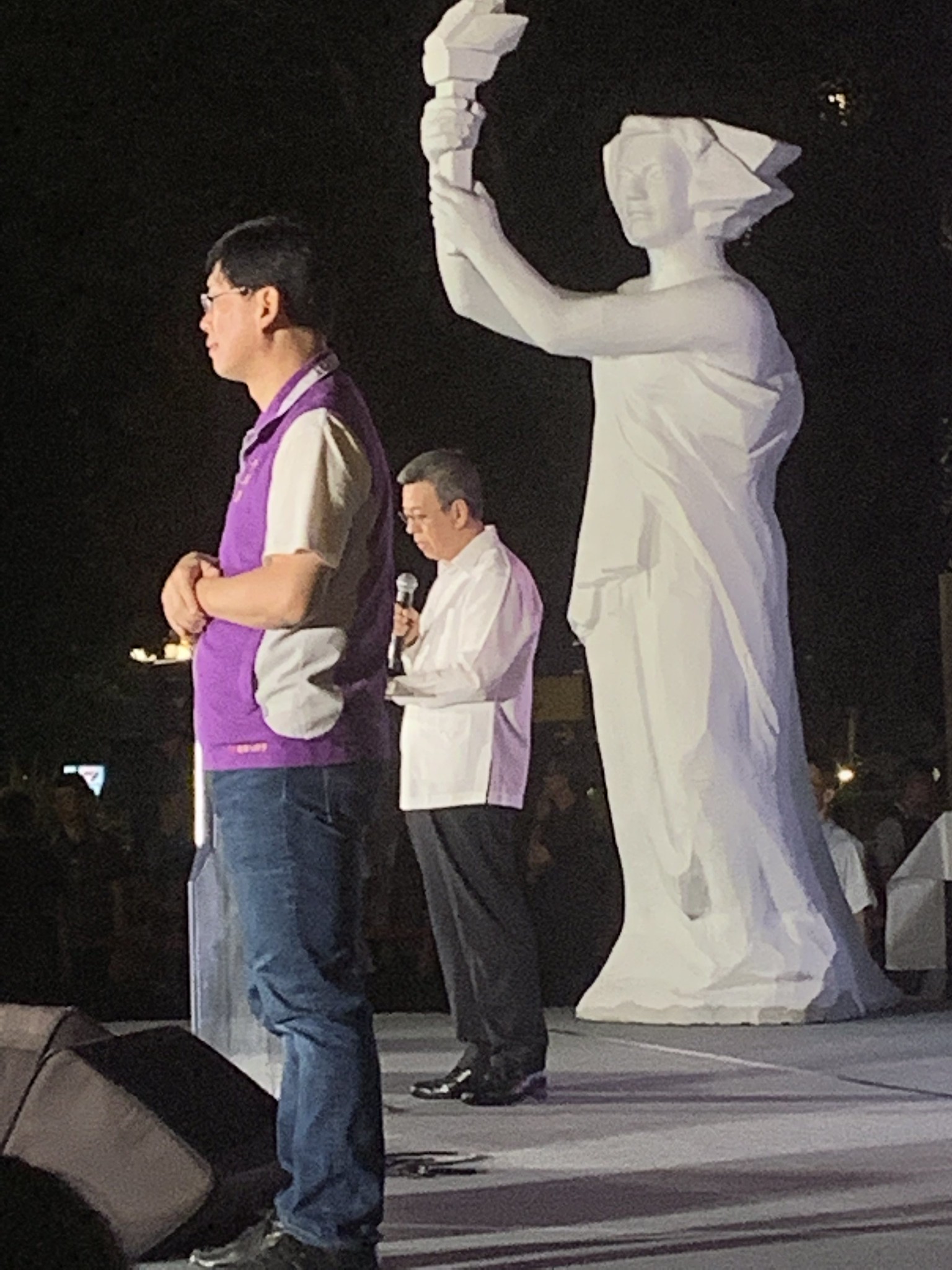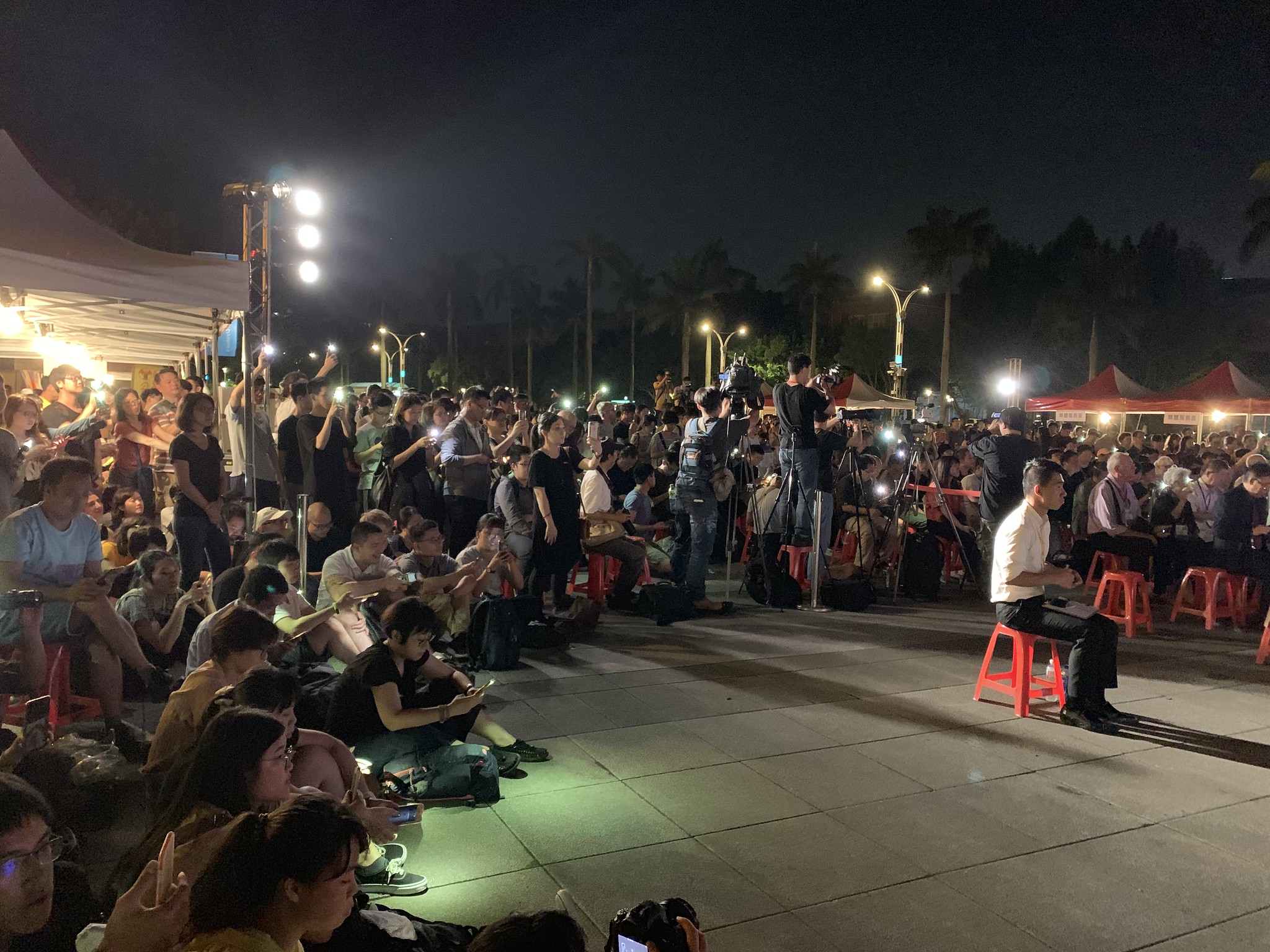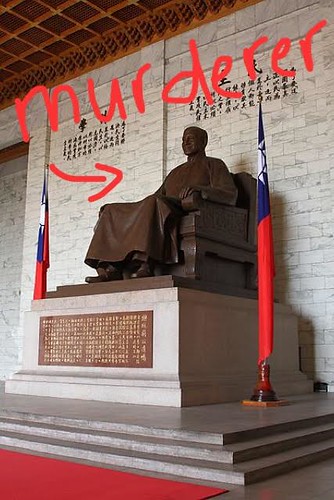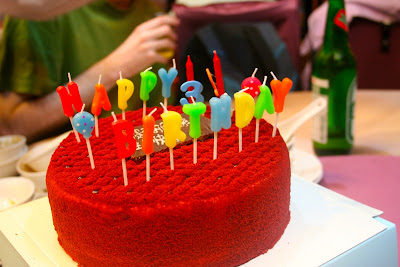
The Transitional Justice Commission has recently unveiled a plan to remove the statue of mass murderer Chiang Kai-shek from his personality cult "memorial hall". The main reason given for this is simple: it's not simply a memorial statue, rather, the entire complex acts more like a temple which directs you to worship the former dictator and architect of Taiwan's brutal White Terror. You can read all about it here.
Honestly speaking, there should be little debate about this. The only nuanced critique I've heard so far has been Michael Turton's, pointing out that yes, the statue will go but the place names will probably remain, and the perpetrators will go unpunished.
I'm not saying debate or dissent should be banned, just that there is no good or sincere counter-argument -- the statue has to go.
The square and park still have public utility as a large, open meeting space with gardens providing greenery and the square itself popular for concerts, protests or simply dance troupe rehearsals. I don't even think the blue-and-white color scheme is ugly. (I do think the National Concert Hall and Theater are less attractive, but are worth keeping as an architectural reminder of the time that the KMT forced foreign aesthetics on Taiwan).
But the statue? No. It's got to go. It should have happened years ago. There is no question now that Chiang was a brutal dictator more interested in using Taiwan -- and eating up its resources -- to "re-take the Mainland" than in any actual care for Taiwan itself. Statues are meant to honor people; they are not neutral conveyances of historical memory. Chiang deserves no honor, therefore, he deserves no statue.
Despite this, the proposal has infuriated a lot of people looking for reasons to be angry, with all the same arguments that always pop up when these sorts of things are discussed: that's cancelling history! (The comment thread on this is deeply entertaining and troubling.) We need the statue to remind us of the past! You can't prove that Chiang was a man with no merit! The government is acting like dictators themselves in trying to remove this statue of a dictator that everyone agrees was a dictator! You're offending all the people who fought for him and retreated to Taiwan! This causes disunity when we should be united, we shouldn't demonize people who still respect a former dictator!
We oppose the @iingwen administration's plan to remove the statue from National Chiang Kai-shek Memorial Hall in the name of transitional justice. The @dpponline should concentrate on promoting social reconciliation instead of rewriting history and fighting partisan struggles. pic.twitter.com/K58kXFTebI
— 中國國民黨 KMT (@kuomintang) September 10, 2021
By now, this "debate" has played out so much that I shouldn't even have to cover the very obvious responses to it all.
I am pretty sure people will remember Chiang Kai-shek without a statue in one of the most prominent parts of the city. He'll still be in history books and museum exhibits. There's a whole park dedicated to retired statues of him that you can go look at (or mock) if you really need a piece of bronze to help you remember.
Statues have never been about "preserving history". Again, statues honor people. One does not need to prove he "has no merit" to prove he doesn't deserve a statue. Hitler was a pretty good painter, but there aren't any statues of him. Young Stalin was a stone-cold hottie, but his statues are mostly gone (I think one or two might still exist as museum pieces). Perhaps someone can argue Chiang did a single good thing for Taiwan, of his own volition -- that is, not pressured by outside forces -- because of some sincere care for Taiwan rather than his own selfish scheme to "re-take the Mainland", a plan in which Taiwan were never asked if they wanted to participate (mostly, they don't). I can't think of a single thing, but even if one could, on the scale of horrors to good deeds, the horrors clearly win.
Why is the "erasing history" argument disingenuous? Because honestly, the people saying these things already know how such debates have played out elsewhere. They already know that people remember horrible dictators even after their statues are removed. They already know that, say, Stalin has not been "forgotten". And they already know that statues don't neutrally mark historical events: nobody thinks that we erect statues of famous people, good and bad, and then keep them there no matter what. Statues are honors, and they know this.
They are perfectly aware that such arguments hold no water, yet they make them anyway. The goal is not to make a good point, it's to manufacture anger. Or they've chosen a side that they think will elevate their political careers, and that side requires them to make obviously ridiculous arguments, knowing some percentage of people inclined to vote for their party will buy them.
When it is sincere, it's still disingenuous. Such people either think the brutalization of Taiwan was justified: that either Chiang still deserves praise for "keeping Taiwan from the Communists", or that the White Terror wasn't so bad, and perhaps even necessary. They know, however, that they can't win on actually praising Chiang, because the history on both of these counts is clear: the ROC did indeed win in Kinmen with a combination of luck and strategy, but nobody seriously -- or should I say nobody serious -- thinks that the PLA wouldn't have eventually taken Taiwan if the KMT hadn't convinced the US to stand by them in the 1950s. As for the "necessity" of the White Terror, we now know thanks to declassified documents and memoirs from the era that most of the people who suffered under it had either committed no crime, or guilty of actions that should never have been crimes in the first place.
They know they won't win by admitting their tongues are raw from licking the memory of Chiang's boots, so instead they choose "historical preservation" instead, because it sounds like a legitimate point. But they also know that it's difficult to win an argument against a person who isn't sincere, because you spend time arguing that their points are wrong. But they already know that.
The KMT as mentioned initiatives such as land reform to show that Chiang is not a man with "no merit". Some praise land reform as a clear positive. It's far from clear, however, that that is actually true.
But it doesn't matter. Again, having some merit is not enough to get you a massive statue in a prominent downtown park, but the point is that it's just not a sincere argument. Even if land reform had been an unproblematic good, nobody erects a massive memorial hall for the guy who did land reform, especially if he also engaged in brutal killing sprees. Nobody also names entire districts, roads and other parks after him.
This is obvious. The land reform touters do know how fatuous it sounds, but they make the argument anyway.
Neither is the Tsai administration "acting like dictators". They were democratically elected by a population which, polls consistently show, does not identify as Chinese and does not want to fulfill Chiang's dearest with of "re-taking" any sort of "Mainland". One poll from 2017 exists saying that most disapprove of DPP actions on memorial Chiang junk, but that poll was sponsored by the KMT. That's hardly reliable. Transitional justice is a well-known global mechanism, widely accepted as part of a post-authoritarian democratic progression. Engaging in it is not "dictatorship".
People who decry any form of transitional justice as some new form of dictatorship are, yet again, perfectly aware that it is a democratic mechanism for dealing with past atrocities. They're not ignorant. This is intentional.
As for "offending" those who fought for the ROC and retreated to Taiwan, I suppose there is some sincere belief here: when you've upended your entire life because you decided to fight for a certain government, to learn later that the very same government you were willing to give your life for in fact ran a brutal terror campaign for decades -- which you barely thought about because perhaps you were not affected -- well, I suppose it must hurt.
It certainly is hard to tell Old Grandpa Ouyang that the guy he believed in, the guy he left China for, turned out to be a mass murderer. It probably hurts to truly believe for most of your life that pushing Chinese culture on a Taiwan you've "liberated" from Japanese imperialism was the right thing to do, only to hear that the government you supported was so horrible that people think of the Japanese era fondly in comparison. (And yes, you do have to be pretty horrible to make the Japanese colonial era look good).
However, I posit that where such reckoning is sincerely and personally difficult, it is also necessary. Grandpa Ouyang won't be around much longer, but his children and grandchildren will, and it helps neither them nor Taiwan to keep up the fiction that Chiang was a great man. At some point many of us have to reckon with the actions of our ancestors, but it doesn't mean we're defined by them. Only be recognizing this can one do better. It also doesn't mean every KMT refugee engaged in the horrors of the White Terror, even if quite a few helped enable it.
Besides, how is it okay to tiptoe around the feelings of a few old soldiers, when so many Taiwanese whose families were torn apart by Chiang and his minions have to put up with him in a big ol' worship-park downtown, with a hagiographic museum to boot? Do the painful memories of the actual victims not count, because it might offend the perpetrators or their enablers?
There's an element of obtuseness here too: the point these veterans and their descendants are trying to make isn't quite "Chiang was good enough to merit a statue", but rather, "removing him forces us to think about our and our ancestors' past actions, and that's painful so we don't want to do it." They are not quite the same thing.
That said, I think some of this 'offense' is performative as well: it's not hard to understand that one's ancestors might have behaved in sub-optimal ways (some more egregiously than others) while realizing that isn't a personal slight against you, now, unless you continue to perpetuate or defend their actions. Either they already know this, or they're choosing not to see it.
In some cases, it's clear perpetuation: the KMT's position doesn't align with the majority of voters, and the DPP has already taken on the 'pro-Taiwan' mantle. They can't claim to be the great saviors of Taiwan, because now we know they weren't. So all they've really got left is identity: Chinese identity. To really dig one's heels into that, at some point, they have to start defending authoritarian symbols because those icons also symbolize the pro-Sinicization mindset they want to retain.
But you can't very well go around defending dictators, so you have to make up arguments like "he did one thing which some argue had some limited benefits, and that's good enough for a massive blue-and-white temple!" or "removing him is erasing history, all statues are merely history and don't have any other meaning!" or "you made Grandpa cry!" or "any movement on this topic amounts to its own authoritarianism!"
Calls that this is divisive at a time when Taiwan should be united are disingenuous as well. Yes, Taiwanese society should be united against the threat from China, which is very real. But the general public consensus on Taiwanese identity and its authoritarian past are fairly clear, and from what I've seen from the KMT, they're the ones being "divisive", which harms "unity". Perhaps they should stop demonizing the DPP to score political points by defending the placement of a statue that venerates a mass murderer.
But come on, the people saying that transitional justice "demonizes" some people know what they are doing. They know perfectly well that crimes against humanity were indeed committed in Taiwan, and they know that those who actually carried them out will likely die before they ever face any consequences. They're aware that the orchestrator of these crimes was Chiang himself, and they know the KMT are the demonizers, not the demonized, and the one sowing disunity.
If they really wanted unity, they'd support efforts at transitional justice. They don't.
If they don't -- if they sincerely believe that the KMT attacks are justified but the DPP's are not, I wonder how it is they logic their way into thinking "unity" always comes at the cost of victims forgiving perpetrators, so the perpetrators' feelings aren't hurt.
Or the most laughable argument I've heard: it's popular with tourists so taking it down is the same as 'cancel culture' which will ruin the tourism industry!
Who are these tourists? The Chinese tourists who are only allowed to come at the CCP's whim, using tour companies mostly owned by Chinese, who made Taiwan a noticeably worse place to live and travel as they'd buy up all the seats and crowd all the sites with all the ugly hotels and shopping malls built for them, and who only ever contributed a tiny percentage to Taiwan's economy, easily made up with tourists from elsewhere once the pandemic eases.
The use of "cancel" in a lot of these crocodile-tear performances is telling, however. Either disingenuous people are hearing this as some sort of online buzzword and applying it to anything they don't like ("disagreeing with me is cancel culture!"), or they're being directed to do so in a deliberate troll operation. It sounds too much like exactly what Western conservatives say to be a coincidence.
Regardless, it's all fake.
Yes, all of it. People know these arguments are bollocks, but they make them anyway to deliberately waste time and sow division.
And if you've read all this and still think "no but taking away that giant statue really is erasing history!" you're being either obtuse or insincere.
You can decide which it is. I don't really care.













































